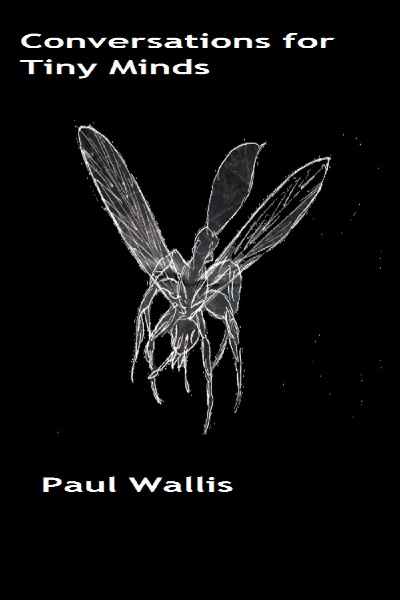
Conversations for Tiny Minds was written largely due to my utter loathing of small talk. Conversations which might as well be held with yourself aren’t conversations. Conversations where nobody’s listening, even to themselves, are just as bad and just as futile. So this very short book is intended as a general kick in the teeth to the culture.
Introduction
The “art” of conversation has now become a sort of verbal graffiti. The occasional expressive phrase may sneak in, but rarely. On the whole it’s now a form of birdcall, complete with endless psychological evaluations for those who wish to analyze what people are saying but don’t listen to what’s actually said. At best, a few fragments are absorbed.
A 100 word speech will be taken in like a sentence. Information is processed by people who’ve never been trained to think beyond single step logic, and the results are appalling. The net effect is to reduce content to its simplest levels, which means that most of the speech is wasted.
The English language has entered a dormant, comatose half-life of quasi-intellectual sloth. The use of language has become a sort of simpering exercise, overloaded with niceties and what can only be politely called a total lack of content. If efficiency were legally required to be part of communication, most of the world’s media would never be able to be published.

Fortunately, most people don’t listen to what they’re saying, either, so a healthy democratic balance between total ignorance and total indifference is easy to maintain. Trains of logic therefore become progressively shorter, and no open-ended statement is in any danger of comprehension. Selective listening has replaced relevance. Information is no longer collected in conversations; it’s edited and spun.
Put simply, conversation is now so dull and so useless it’s barely above grunting level. Social gatherings sound like bird calls, and conversations in groups contain about as much useful information. People even build conceptual nests in group conversations in the form of that laughable theory of “positioning”, and then lay verbal eggs.
Management science, that rest home for the interminably verbose, has become a way of torturing sentences. Political “speech”, if you can call predictable self-serving drivel a form of speech, has undermined any need to listen to content.
How so many so-called “thought leaders” can produce so much sales spiel for their very limited concepts is another facet of the total destruction of meaningful language. A duly-revered person with the academic and professional qualifications of a fruit fly can babble on inconsequentially and even contradict themselves for decades, without criticism or even objective analysis, and be hailed as a true intellectual.
This phenomenon was noted years ago, but it’s now a subject of study, of which this book is perhaps the least tolerant likely to be written. The title is based on the “For Dummies” series, a series of books I’ve never read and never will. I despise patronizing titles, and the title is also a send up.
It could have been called “Conversations for the mindless”, but that’d be telling, wouldn’t it? If I wanted to go on holiday and become a self-proclaimed “thought leader”, I could have called it “Exercises in extended verbal logic for the inept and verbally incompetent”, but I’m not really excited by frivolous, self-serving euphemisms.
What a pity.
This is a series of satirical but hopefully murderous perspectives on the associative uses of language. It’s intended to be a kick in the teeth to an intellectual culture which doesn’t deserve to be considered a dysfunctional urinal, not a How To Talk To Other People Manual.
For those whose main contribution to conversations is that wonderful catchall phrase, “What are we talking about now?” may I suggest euthanasia, prior to reading.
